Films with theme "Molière au cinéma", sorted by revenue

The Miser (1980)
, 2hDirected by Louis de Funès, Jean Girault
Origin France
Genres Comedy
Themes Théâtre, Films based on plays, Molière au cinéma
Actors Louis de Funès, Michel Galabru, Claude Gensac, Hervé Bellon, Franck Cabot-David, Georges Audoubert
Le riche et avare Harpagon n'aime que son argent. Il voit des voleurs partout et soupçonne tout le monde de vouloir lui voler son argent.

Cycling with Molière (2013)
, 1h44Directed by Philippe Le Guay
Origin France
Genres Drama, Comedy
Themes Théâtre, Molière au cinéma
Actors Fabrice Luchini, Lambert Wilson, Maya Sansa, Camille Japy, Philippe du Janerand, Ged Marlon
Gauthier Valence, acteur de cinéma et télévision qui connaît un grand succès, a décidé de monter lui-même Le Misanthrope. Il effectue un voyage express à l'île de Ré afin de commencer la distribution des rôles. Il espère y convaincre son ami et grand acteur, Serge Tanneur, de remonter sur les planches.

Tartuffe (1926)
, 1h14Directed by Friedrich Wilhelm Murnau
Origin German
Genres Drama, Comedy
Themes Théâtre, Films based on plays, Molière au cinéma
Actors Werner Krauss, Lil Dagover, Lucie Höflich, Emil Jannings, Hermann Picha, Camilla Horn
Un vieux conseiller est dupe de l'hypocrisie de sa gouvernante : pour lui ouvrir les yeux, son petit-fils va lui projeter une comédie filmée intitulée « Tartuffe ». La séance terminée, l'impudente sera démasquée et chassée.
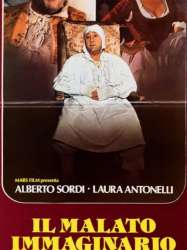
Hypochondriac (1979)
, 1h47Directed by Tonino Cervi
Origin Italie
Genres Comedy
Themes Théâtre, Films based on plays, Molière au cinéma
Actors Alberto Sordi, Laura Antonelli, Bernard Blier, Christian De Sica, Ettore Manni, Vittorio Caprioli
In Rome the rich and stingy landowner Argante believed to be sick in any possible harm, although born as a fish. Another thing that the cruel man holds great attention is his money and his contract with a young doctor for the wedding of his daughter Lucrezia. In fact, the good catch is considered the girl a total moron who knows nothing about medicine, but Don Argante not pay much attention and just think to combine the deal as soon as possible. Meanwhile his wife, without his or her knowledge, betrays him with another. Comes the doctor betrothed his daughter to the house of Argante, as he finds himself in yet another false relapse, and thus begins to visit him. Argante now realizes the nonsense that says the young but is only about money and does not care. Later, between the master and his servant turns a strong argument that Argante is not loved by anyone in the family except by his servants. To test the family Argante is persuaded by the servants to pretend to be dead in order to discover the hatred that his wife and family have of him and so it happens. As if that were not enough rich to the poor has been stolen also deposit money.
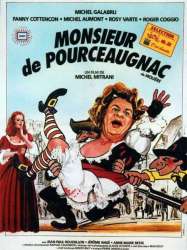
Monsieur de Pourceaugnac (1985)
, 1h31Origin France
Genres Comedy
Themes Théâtre, Films based on plays, Molière au cinéma
Actors Michel Galabru, Roger Coggio, Fanny Cottençon, Jérôme Anger, Jean-Paul Roussillon, Rosy Varte
Monsieur de Pourceaugnac, ridicule tant par ses vêtements que par son comportement, se rend du Limousin à Paris pour y épouser Julie. Elle est la fille d'Oronte. C'est lui qui a arrangé le mariage. Mais Julie et Eraste s'aiment. Et ils ont décidé d'empêcher le mariage prévu, grâce aux intrigues de Sbrigani, aidé de Nérine et Lucette. Eraste accueille M. de Pourceaugnac, lui fait croire qu'il est un vieil ami de sa famille et lui présente Sbrigani, pour le guider à Paris.
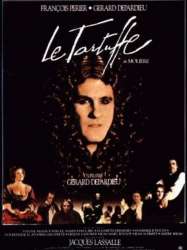
Le tartuffe (1984)
, 2h20Directed by Gérard Depardieu
Origin France
Genres Drama, Comedy
Themes Théâtre, Films based on plays, Molière au cinéma
Actors Gérard Depardieu, François Périer, Élisabeth Depardieu, André Wilms, Yveline Ailhaud, Hélène Lapiower
Orgon est un homme de biens dupé par la fausse piété du sans le sou Tartuffe. Orgon le prend dans sa maison, le croyant un parangon de vertu. Orgon ordonne à sa fille de rejeter son fiancé et d'épouser Tartuffe. D'abord Dorine, la servante de la famille, tente une stratégie pour éviter le mariage ; puis le fils d'Orgon tente sa chance. Ils irritent Orgon, et pour prouver la puissance paternelle, il déshérite son fils et fait de Tartuffe son héritier. Ensuite, la femme d'Orgon essaie d'apporter un aperçu à son mari, un stratagème qui se retourne partiellement contre lui. Avec l'huissier à la porte ordonnant à Orgon de quitter sa propre maison et avec Tartuffe à la cour pour prouver qu'Orgon est un traître, tout semble perdu.
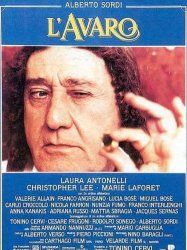
The Miser (1990)
, 1h57Directed by Tonino Cervi
Origin Italie
Genres Comedy
Themes Théâtre, Films based on plays, Molière au cinéma
Actors Alberto Sordi, Laura Antonelli, Valérie Allain, Miguel Bosé, Lucia Bosè, Franco Interlenghi
The rich and miserly Don Arpagone lives his days following precise patterns and commanding his servants and sons. He wants to marry a rich girl named Marianna, but is loved by the boy Valerio, without Arpagone know. As if that were not enough, Arpagone, in addition to wanting the inheritance of the new bride, intends to marry his daughter with a rich noble to earn more money.
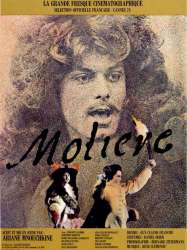
Molière (1978)
, 4h4Directed by Élie Chouraqui, Ariane Mnouchkine
Origin France
Genres Drama, Biography, Historical
Themes Films about writers, Politique, Théâtre, Political films, Films about royalty, Molière au cinéma
Actors Marie-Françoise Audollent, Roger Planchon, Philippe Caubère, Joséphine Derenne, Brigitte Catillon, Maurice Chevit
Jean-Baptiste Poquelin is raised by his father and his grandfather because his mother dies when he's still very little. He works as a handyman, studies the law at a university and travels the country as an actor before he becomes the celebrated playwright Molière who impresses firstly the Duke of Orleans and then even King Louis XIV.
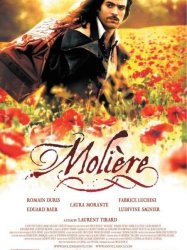
Moliere (2007)
, 2hDirected by Laurent Tirard
Origin France
Genres Drama, Biography, Comedy, Romance
Themes Films about writers, Théâtre, Molière au cinéma
Actors Romain Duris, Laura Morante, Ludivine Sagnier, Fabrice Luchini, Édouard Baer, Fanny Valette
The film begins in 1658, when the French actor and playwright returns to Paris with his theatrical troupe to perform in the theater the king's brother has given him. Most of the film is in the form of a flashback to 1645. Following an unsuccessful run as a tragic actor, Molière is released from debtor's prison by Monsieur Jourdain (Fabrice Luchini), a wealthy commoner with social pretensions, who agrees to pay the young actor's debts if Molière teaches him to act.

Molière (1910)
Directed by Léonce Perret
Themes Théâtre, Molière au cinéma
Actors André Bacqué, Abel Gance, Fabienne Fabrèges, Jeanne Marie-Laurent, Léonce Perret, Valentine Petit
Un film sur la vie de Molière.

L'École des femmes (1940)
Directed by Max Ophüls
Origin France
Themes Théâtre, Films based on plays, Molière au cinéma
Actors Louis Jouvet, Madeleine Ozeray, Raymone, Alexandre Rignault
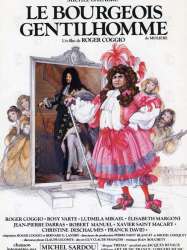
Le Bourgeois gentilhomme (1982)
, 2h15Directed by Roger Coggio
Origin France
Genres Comedy
Themes Théâtre, Films based on plays, Molière au cinéma
Actors Michel Galabru, Rosy Varte, Élisabeth Margoni, Franck Cabot-David, Roger Coggio, Xavier Saint-Macary
Monsieur Jourdain, parvenu enrichi et naïf, rêve d’être reconnu dans la haute société. Il engage à cet effet des maîtres de musique, de danse, de philosophie. La folie des honneurs, des décorations, de la puissance s’est emparée de notre bourgeois.
 , 1h45
, 1h45Directed by Kurt Hoffmann
Origin German
Genres Comedy, Musical
Themes Films based on mythology, Théâtre, Musical films, Films based on Greco-Roman mythology, Films based on plays, Dans la Grèce mythologique, Films based on Greco-Roman mythology, Molière au cinéma
Actors Willy Fritsch, Fita Benkhoff, Paul Kemp, Hilde Hildebrand, Aribert Wäscher, Ewald Wenck
Amphitryon is a Theban general away at war. The god Jupiter disguises himself as Amphitryon to seduce Amphitryon's wife, Alkmene.

The Miser (1908)
, 5minutesDirected by Georges Méliès
Origin France
Themes Théâtre, Films based on plays, Molière au cinéma
Dans une chambre plutôt délabrée, un vieil homme anxieux, Harpagon, compte ses sous. Entendant du bruit, il cache son or dans l'armoire, et ouvre la porte à un jeune homme (Cléante?) qui vient lui demander un prêt. Il l'éconduit, et retourne compter son argent. Dérangé à nouveau, il dissimule sa cassette dans la poubelle et ouvre la porte à une femme accompagnée de deux jeunes enfants qui vient également le solliciter. Il ouvre une immense armoire. (Ellipse, ou coupe sauvage) On retrouve Harpagon dans un jardin devant un puits, faisant les poches d'un homme à la recherche de sa cassette. Manquant de se jeter à l'eau, il est retenu par un groupe de trois hommes et deux femmes. Chancelant, il explique la raison de son désespoir. L'un des hommes trouve la cassette, et la lui remet. Extatique, il brasse les papiers-monnaie, sans en distribuer un seul. La petite troupe le hue et il sort, ridicule.
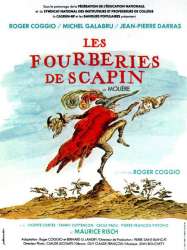
The Impostures of Scapin (1981)
, 1h47Directed by Roger Coggio
Origin France
Genres Comedy
Themes Théâtre, Films based on plays, Molière au cinéma
Actors Roger Coggio, Michel Galabru, Jean-Pierre Darras, Maurice Risch, Pierre-François Pistorio, Cécile Paoli
D’après la pièce de théâtre homonyme de Molière.
 Connection
Connection